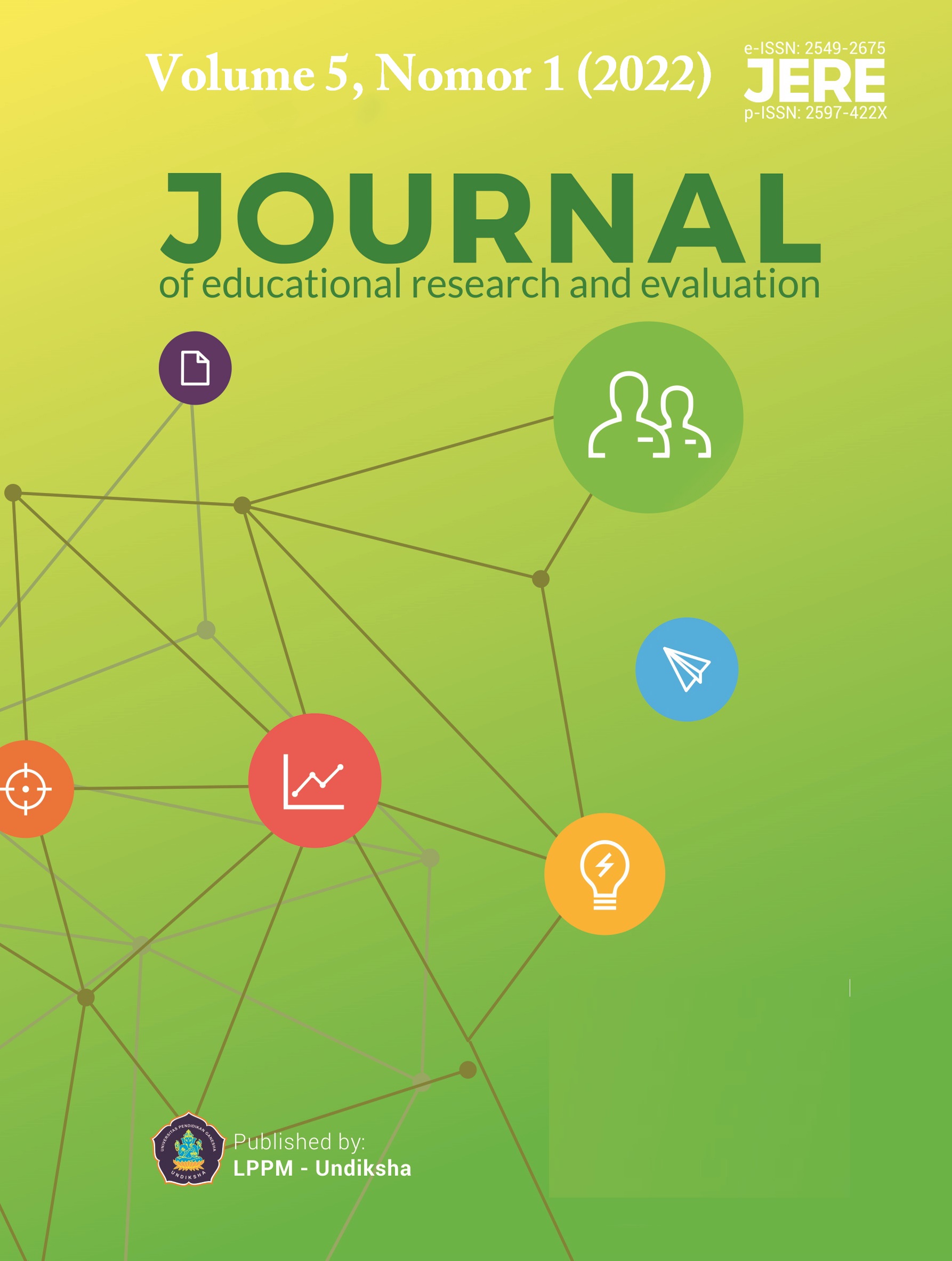The Development of an Inquiry-Based Laboratory Manual for Student of Biology Education
DOI:
https://doi.org/10.23887/jere.v5i1.29203Keywords:
laboratory manual, inquiry, biology, ADDIE modelAbstract
Inquiry enables the student to learn through many activities that can improve student attitudes, processes, and thinking skills. Inquiry learning helps students develop their ability to solve the problem, think critically and reflectively. Applying inquiry-based activities in laboratory courses is one way to prompt the student-centered learning in general biology courses. The research aimed to develop a valid and practical inquiry-based laboratory manual for biology education students. This study used the ADDIE model to develop the product, the stages involve analysis, design, development, implementation, and evaluation. The implementation was conducted on 30 biology education students who take general biology courses. The data were collected by the validation sheet and questionnaire of student responses. The inquiry-based laboratory manual that has been developed gets a very decent category as a validation result. Practical of inquiry-based laboratory manual obtained from student response and it got a very practical category. The product is expected able to guide the student to do an inquiry process in laboratory activities.
References
Astuti, Y., & Setiawan, B. (2013). Pengembangan lembar kerja siswa (LKS) berbasis pendekatan inkuiri terbimbing dalam pembelajaran kooperatif pada materi kalor. Jurnal Pendidikan IPA Indonesia, 2(1), 88–92. https://doi.org/10.15294/jpii.v2i1.2515.
Bruck, L. B., Bretz, S. L., & Towns, M. H. (2008). Characterizing the Level of Inquiry in the Undergraduate Laboratory. Journal of College Science Teaching, 38(1), 52–58. https://cursa.ihmc.us/rid=1Q3XD4DZ3-1WDCR3Y-.
Carol Collier Kuhlthau. (2008). Guided Inquiry: Learning in the 21st Century (review). Portal: Libraries and the Academy, 8(3), 339–340. https://doi.org/10.1353/pla.0.0010.
Damopolii, I., Nunaki, J. H., Nusantari, E., & Kandowangko, N. Y. (2020). The effectiveness of Inquiry-based learning to train students’ thinking skill based on SOLO taxonomy. Journal of Physics: Conference Series, 1567(4), 505–516. https://doi.org/10.1088/1742-6596/1567/4/042025.
French, D., & Russell, C. (2002). Do graduate teaching assistants benefit from teaching inquiry-based laboratories? BioScience, 52(11), 1036–1041. https://doi.org/10.1641/0006-3568(2002)052[1036:DGTABF]2.0.CO;2.
Gormally, C., Brickman, P., Hallar, B., & Armstrong, N. (2009). Effects of Inquiry-based Learning on Students’ Science Literacy Skills and Confidence. International Journal for the Scholarship of Teaching and Learning, 3(2). https://doi.org/10.20429/ijsotl.2009.030216.
Handayani, L. P., F, F., & Anhar, A. (2014). Pengembangan Buku Penuntun Praktikum IPA Berbasis Inkuiri Terbimbing Untuk SMP Kelas VII Semester II. 69–76. https://ejournal.unp.ac.id/index.php/kolaboratif/article/view/4939.
Indriwati, S. E., Susilo, H., & Anggrella, D. P. (2018). Penerapan Model Pembelajaran Inkuiri Terbimbing Berbasis Lesson Study pada Matakuliah Keanekaragaman Hewan untuk Meningkatkan Kecakapan Komunikasi dan Hasil Belajar Kognitif Mahasiswa Pendidikan Biologi. Jurnal Pendidikan Biologi, 9(2), 38–46. http://dx.doi.org/10.17977/um052v9i2p38-46.
Kenengsih, S. (2017). Pengembangan Penuntun Praktikum Mikrobiologi Berorientasi Inkuiri Terbimbing Untuk Mahasiswa Stkip Pgri Sumatera Barat. Saintifik, 1(2). http://dx.doi.org/10.33387/sjk.v1i2.534.
Lubis, L. T., Silaban, R., & Jahro, S. (2016). Pengembangan Penuntun Praktikum Kimia Dasar I Terintegrasi Pendekatan Inkuiri. Jurnal Pendidikan Kimia, 8(2), 20–30. https://doi.org/10.24114/jpkim.v8i2.4435.
Nengsi, sri. (2016). Pengembangan Penuntun Praktikum Biologi Umum Berbasis Inkuiri Terbimbing Mahasiswa Biologi STKIP Payakumbuh. Jurnal Ipteks Terapan, 10(1), 1–10. https://doi.org/10.22216/jit.2016.10.1.343.
Nunaki, J. H., Damopolii, I., Kandowangko, N. Y., & Nusantari, E. (2019). The effectiveness of inquiry-based learning to train the students’ metacognitive skills based on gender differences. International Journal of Instruction, 12(2), 505–516. https://doi.org/10.29333/iji.2019.12232a.
Nurussaniah, N., & Nurhayati, N. (2016). Berbasis Guided Inquiry Untuk Meningkatkan Kemampuan. Prosiding Seminar Nasional Fisika, V, 63–68. https://doi.org/10.21009/0305010214.
Rahmat, I., & Chanunan, S. (2018). Open inquiry in facilitating metacognitive skills on high school biology learning: An inquiry on low and high academic ability. International Journal of Instruction, 11(4), 593–606. https://doi.org/10.12973/iji.2018.11437a.
Ryker, K. D., & McConnell, D. A. (2017). Assessing Inquiry in Physical Geology Laboratory Manuals. Journal of Geoscience Education, 65(1), 35–47. https://doi.org/10.5408/14-036.1.
Sulistyowati, E., Rohman, F., & Ibrohim. (2020). Perangkat Pembelajaran Inkuiri Terbimbing Berbantuan Handout Berbasis Potensi Lokal Hutan Mangrove untuk Meningkatkan Kemampuan Berpikir Kritis dan Sikap Peduli Lingkungan. Jurnal Pendidikan, 5(3), 374–379. http://dx.doi.org/10.17977/jptpp.v5i3.13272.
Syamsu, F. D. (2017). Pengembangan Penuntun Praktikum Ipa Berbasis Inkuiri Terbimbing Untuk Siswa SMP Siswa Kelas VII Semester Genap. BIOnatural, 4(2), 13–27. https://ejournal.stkipbbm.ac.id/index.php/bio/article/view/190.
Umah, S. K., Sudarmin, S., & Dewi, N. R. (2014). Pengembangan Petunjuk Praktikum IPA Terpadu Berbasis Inkuiri Terbimbing pada Tema Makanan dan Kesehatan. Unnes Science Education Journal, 3(2). 511–518. https://journal.unnes.ac.id/sju/index.php/usej/article/view/4267.
Waluyo, M. E., & Parmin. (2014). Pengembangan Panduan Praktikum Ipa Terpadu Berbasis Inkuiri Terbimbing Tema Fotosintesis Untuk Menumbuhkan Keterampilan Kerja Ilmiah Siswa Smp. USEJ - Unnes Science Education Journal, 3(3). https://doi.org/10.15294/usej.v3i3.4286.
Widyaningrum, D. A., & Wijayanti, T. (2019). Implementasi buku petunjuk praktikum biokimia berbasis inkuiri terbimbing untuk meningkatkan kemampuan kerja ilmiah. Edubiotik : Jurnal Pendidikan, Biologi Dan Terapan, 4(02), 58–67. https://doi.org/10.33503/ebio.v4i02.437.
Downloads
Published
How to Cite
Issue
Section
License
Authors who publish with the Journal of Evaluation and Research in Education (JERE) agree to the following terms:
- Authors retain copyright and grant the journal the right of first publication with the work simultaneously licensed under a Creative Commons Attribution License (CC BY-SA 4.0) that allows others to share the work with an acknowledgment of the work's authorship and initial publication in this journal.
- Authors are able to enter into separate, additional contractual arrangements for the non-exclusive distribution of the journal's published version of the work (e.g., post it to an institutional repository or publish it in a book), with an acknowledgment of its initial publication in this journal.
- Authors are permitted and encouraged to post their work online (e.g., in institutional repositories or on their website) prior to and during the submission process, as it can lead to productive exchanges, as well as earlier and greater citation of published work. (See The Effect of Open Access)











